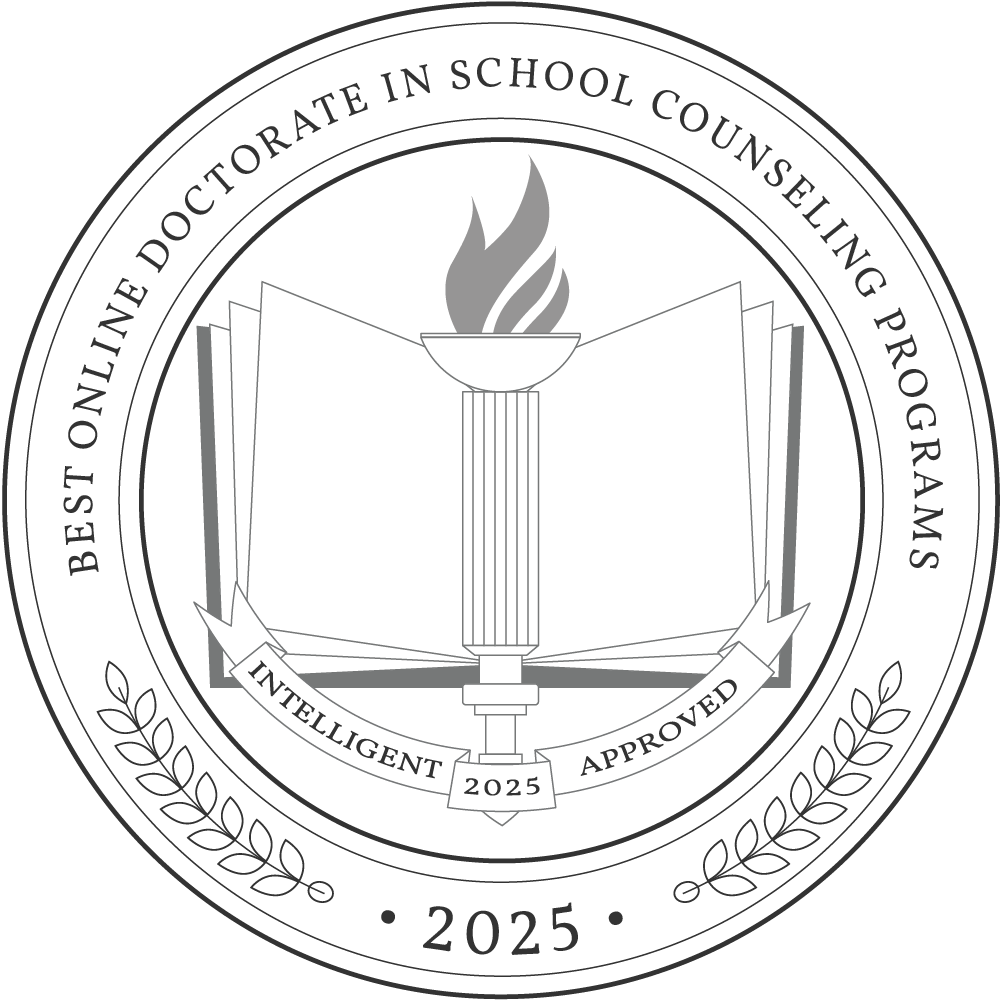For individuals holding a master’s degree in counseling or a related field and aspiring to elevate their careers, pursuing an online doctorate in school counseling represents a flexible and accessible pathway to achieving those goals. These advanced programs are designed to prepare students for high-level roles within the educational system, potentially positioning them among their field’s top 10% earners, with annual salaries exceeding $98,530.
Completing such a degree typically takes three to five years, depending on the student’s pace and program structure. The average cost of these programs was $19,749 for the 2020-2021 academic year but will vary depending on the institution. By choosing this path, you’ll be investing in your professional development and in a future where you’re prepared to impact educational communities and the students within them significantly.
Why Trust Us
The Intelligent.com Higher Education Team is dedicated to providing students with independent, equitable school and program rankings and well-researched resources. Our expert-driven articles cover topics related to online colleges and programs, paying for school, and career outlooks. We use data from the U.S. Department of Education’s College Scorecard, the National Center for Education Statistics, and other reputable educational and professional organizations. Our academic advisory team reviews content and verifies accuracy throughout the year for the most current information. Partnerships do not influence rankings or editorial decisions.
- Analyzed over 2,000 national, accredited, and nonprofit colleges and universities
- 800+ rankings pages are reviewed and updated yearly
- Content is informed by reputable sources, surveys, and interviews with academic advisors and other experts
- Over 100 data points are reviewed for accuracy and quality throughout the year, including sources
How we rank schools
Our list features the best online Doctorate in School Counseling degree programs at top colleges nationwide. Each school featured is a nonprofit, accredited institution — either public or private — with a high standard of academic quality for post-secondary institutions.
We evaluated each school’s program on tuition costs, admission, retention and graduation rates, faculty, reputation, and the student resources provided for online students. We collected data from trusted sources like the National Center for Education Statistics, individual school and program websites, school admissions counselors, and other data sources. Then, we calculated the Intelligent Score on a scale of 0 to 100 based on the following criterion:
Academic Quality:
- Admission rate versus enrollment rate
- Retention rate of students who return after year one
- Accreditation status (regional and programmatic)
- Nonprofit status, both private and public institutions
Graduation Rate
- Overall graduation rate
- Total number of currently enrolled students, including diversity metrics
- Student-to-faculty ratio
Cost and ROI
- In-state and out-of-state per-credit tuition rates and fees
- Required credits to graduate
- Earning potential after graduation
- Availability of federal student loans, scholarships, and other financial aid options
Student Resources
- Available student services for online-only and hybrid programs
- On-campus amenities like tutoring centers and the number of libraries
Read more about our ranking methodology.
Best 7 Accredited Online Doctorate in School Counseling Programs
FiltersInstitution Type
Status
- Intelligent Score
- Alphabetically By University Name
- Acceptance Rate
- Enrollment
- In-state Graduate Tuition
- Out-of-state Graduate Tuition
- In-state Undergraduate Tuition
- Out-of-state Undergraduate Tuition

University of West Georgia
Intelligent Score: 98.97In-state: $4,371
Out-of-state: $15,426
In-state: $4,338
Out-of-state: $4,338
SAT: 900-1090
ACT: 17-22
$312
Online
Southern Association of Colleges and Schools Commission on Colleges
60

Oregon State University
Intelligent Score: 96.52In-state: $9,846
Out-of-state: $29,445
In-state: $13,257
Out-of-state: $13,257
SAT: 1080-1310
ACT: 21-29
$590
Online, On-Campus
Northwest Commission on Colleges and Universities
100

Mississippi College
Intelligent Score: 96.09In-state: $18,200
Out-of-state: $18,200
In-state: $11,610
Out-of-state: $11,610
SAT: 1140-1260
ACT: 21-29
$750
Online
Southern Association of Colleges and Schools Commission on Colleges
72

Hampton University
Intelligent Score: 95.39In-state: $26,198
Out-of-state: $26,198
In-state: $13,099
Out-of-state: $13,099
SAT: N/A
ACT: N/A
$695
Online
Southern Association of Colleges and Schools Commission on Colleges
64

Shippensburg University
Intelligent Score: 94.16In-state: $9,570
Out-of-state: $10,048
In-state: $9,288
Out-of-state: $9,288
SAT: 940-1150
ACT: 15-23
Resident: $671
Non-Resident: $1,006
Online, On-Campus
Council for Accreditation of Counseling and Related Educational Programs
60

University of the Cumberlands
Intelligent Score: 93.01In-state: $9,875
Out-of-state: $9,875
In-state: $4,282
Out-of-state: $4,282
SAT: 930-1140
ACT: 19-24
$449
Online
Council for Accreditation of Counseling and Related Educational Programs
66

The Chicago School
Intelligent Score: 92.88In-state: $46,796
Out-of-state: $46,796
In-state: $50,636
Out-of-state: $50,636
SAT: Not Required
ACT: Not Required
$1,703
Online
Council for Accreditation of Counseling and Related Educational Programs
60
How to Choose an Online Doctorate in School Counseling Program
Choose your area of study
As a prospective doctoral student in counseling, choosing an area of study is a pivotal first step — it’ll help narrow down your interests and focus on programs that align with your career goals.
Also called specializations or concentrations, these opportunities will vary depending on the institution you attend. Potential specializations include trauma and crisis intervention, suited for those interested in supporting students through challenging times; college and career readiness, ideal for counselors wanting to guide students in post-secondary planning; and multicultural counseling, perfect for individuals focused on promoting diversity and inclusivity in educational settings.
Research schools and programs
After identifying a specialization, you can begin researching schools and programs, bearing in mind that not all institutions may offer your specific focus but may provide relevant coursework. To further guide your research, consider the following questions:
- What is the program’s accreditation status?
- How does the curriculum support my career goals?
- What opportunities for practical experience are available?
- Are there faculty members with expertise in my area of interest?
Information on programs and specializations can be found by speaking with admissions counselors, exploring program websites, and attending virtual open houses.
Prepare for tests and applications
To best prepare for doctoral applications and the GRE, you’ll want to focus on writing a compelling personal statement and achieving competitive test scores.
The personal statement is your opportunity to highlight your passion, experience, and goals in school counseling, making a solid case for your candidacy. Consider enrolling in a test prep program for the GRE, which can provide strategies and practice to improve your scores.
Additionally, ensure your application includes all required elements — academic transcripts, letters of recommendation, and any program-specific requirements. Thorough preparation and attention to each component will strengthen your application, illustrating your readiness for doctoral-level study.
Select your program
Once acceptance letters arrive, selecting a program can be simplified by revisiting critical factors from your initial research, which may vary by student.
Consider the program’s alignment with your specialization, faculty credentials, and opportunities for practical experience. Don’t forget to evaluate practical aspects such as the total cost of attendance and available financial aid opportunities.
Ultimately, reflecting on what matters most to you in these areas can guide you toward making an informed decision that best supports your academic and career goals.
Determine how you’ll pay for your degree
To finance your degree without accruing significant debt, prioritize financial aid opportunities that don’t require repayment. Start with scholarships and grants, awarded based on merit or need and don’t need to be repaid. Additionally, explore assistantships and fellowships offered by your institution; these provide financial support and valuable work experience. With these resources, you may even be able to earn your doctorate for free.
For any remaining financial gaps, consider federal loans, which typically offer lower interest rates and more flexible repayment options than private loans.
What Can You Expect From an Online Doctorate in School Counseling Program?
An online doctorate in school counseling offers a transformative experience for ambitious professionals aiming to reach the top of their field. This rigorous program, spanning three to five years, is designed to equip students with advanced knowledge in counseling practices, leadership, advocacy, and program development tailored to educational settings. Participants study complex topics such as ethical considerations, diversity and inclusion, intervention strategies, and data-driven decision-making to support student success.
A hallmark of doctoral education is the dissertation, a substantive research project that demands students to investigate and contribute new knowledge to school counseling. Some programs may include residencies or internships, providing hands-on experiences in diverse educational environments.
Students who are passionate about the psychological aspects of school counseling should also consider online doctorate in psychology programs, as this may be a better fit for your personal interests and professional goals.
Potential courses you’ll take in an online doctorate in school counseling program
- Advanced Counseling Theories and Techniques: A common doctoral degree requirement, this course thoroughly examines contemporary counseling theories and their application in educational settings. Students learn to integrate counseling models into practice, tailoring interventions to meet diverse student needs and promoting positive outcomes.
- Multicultural Counseling in Schools: Focusing on the importance of cultural competence in school counseling, this course explores strategies for effectively working with students from diverse backgrounds. Topics include understanding cultural influences on student behavior, developing culturally responsive interventions, and fostering an inclusive school environment.
- Leadership and Advocacy in School Counseling: Students learn to navigate the role of school counselors as leaders and advocates within educational systems. The course covers strategies for leading school-wide initiatives, advocating for student needs, and collaborating with stakeholders to create supportive learning environments.
- Ethical and Legal Issues in School Counseling: Students explore the ethical and legal frameworks guiding the practice of school counseling. This course covers professional ethics, legal responsibilities, and decision-making processes critical to protecting student welfare and ensuring equitable access to counseling services.
What Can I Do With an Online Doctorate in School Counseling Degree?
An online doctorate in school counseling provides graduates with advanced skills that students can apply across various industries, including education, mental health services, and human resources.
Students graduate with a thorough understanding of psychology, counseling techniques, team dynamics, and conflict resolution, making them eligible for leadership positions such as school counselor director, school psychologist, and mental health counselor.
A doctorate in school counseling is a high-level degree that qualifies graduates for leadership and executive positions. With a Ph.D. in school counseling, students can continue their education and pursue academia, research, or advanced clinical positions.
Career outlook
- School and career counselor — Prepare students for life after graduation by helping them with social or behavioral challenges, evaluating their abilities and interests, and exploring career or academic opportunities.
- Median annual salary: $61,710
- Projected employment growth (through 2032): 5%
- New jobs projected: 26,600
- Rehabilitation counselor — Assist individuals with physical, mental, developmental, or emotional disabilities in living independently and transitioning through significant changes, such as graduating from school.
- Median annual salary: $44,040
- Projected employment growth (through 2032): 2%
- New jobs projected: 6,700
- Psychologist — Identify, assess, and treat emotional, behavioral, or organizational disorders; research behaviors and techniques to improve these disorders and better understand the human mind.
- Median annual salary: $92,740
- Projected employment growth (through 2032): 6%
- New jobs projected: 12,800
Online Doctorate in School Counseling Degree Frequently Asked Questions
How do I apply to an online doctorate in school counseling degree program?
To apply for these programs, you must submit a comprehensive application, including a personal statement, letters of recommendation, GRE scores, and a master’s degree in counseling or a related field.
The personal statement and GRE scores are critical components that reflect your commitment and potential. For the personal statement, focus on articulating your enthusiasm for school counseling, your professional goals, and how the program aligns with your career aspirations. To excel on your GRE, consider enrolling in a test prep program — potentially boosting your scores.
Before submitting your application, it’s crucial to consult with an admissions counselor to understand the program specifics and tailor your applications accordingly.
How much does an online doctorate in school counseling degree cost?
For the 2020-2021 academic year, the average tuition for graduate programs was $19,749. However, online programs may offer financial benefits over in-person options, such as reduced fees for campus facilities and commuting costs. Additional expenses typically include textbooks, virtual learning fees, and any required residencies or internships, which might incur travel and accommodation expenses. It’s essential to factor in these costs when planning your budget, although the flexibility and potential savings on commuting and housing can make online programs a financially attractive option.
How long does it take to earn an online doctorate in school counseling degree?
Earning this degree typically takes three to five years, depending on the program structure, whether you’re attending full-time or part-time, and the dissertation completion time. It’s important to note that these online programs are designed to accommodate working professionals, offering flexibility in scheduling and pacing — which may mean that they may take longer to complete. Some programs may have a set sequence of courses and a timeline for dissertation work, while others provide more autonomy to tailor the duration based on individual progress and commitments.
It’s also essential to consider the program’s total number of required credits when calculating completion time, as this figure can vary by institution. Generally speaking, the more credits required, the longer it will take to complete.
Is a doctorate in school counseling degree worth it?
A doctorate in school counseling opens the door for advanced career opportunities and increased earning potential. With the expert skills and knowledge obtained throughout the degree, graduates are equipped to pursue leadership positions in the field. These positions often place in the top 10% of earners, with a median salary of over $100,050.
While a doctorate is essential for many advanced roles, those looking for a more immediate way to enter the field can complete a bachelor’s or master’s degree, making them eligible for most entry- to mid-level positions.
Compare School Options
Related Degrees
- School Counseling
- Human and Family Development
- Christian Counseling
- Educational Psychology
- Counseling
- Addictions and Recovery
- BCBA Master's Programs
- Psychology Program
- Psychology
- Substance Abuse Counseling

